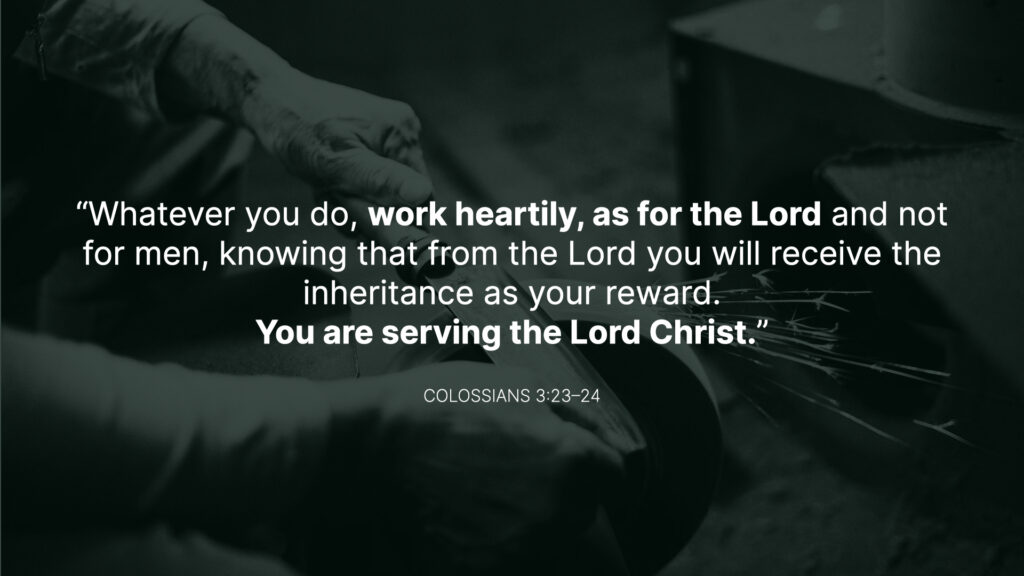Have you ever felt like your work was meaningless?
We all want to feel like our work matters. But some aspects of our callings don’t feel particularly meaningful. Whether it’s writing reports, performing repetitive tasks, or just doing the laundry, at times parts of our work (and sometimes all of it) can often feel pointless.
So how do we have a God-glorifying attitude toward the boring parts of our jobs?
Trellis and Vine Work

In their book, The Trellis and the Vine, Colin Marshall and Anthony John Payne explore the twin concepts of trellis and vine work as it relates to ministry. Their thesis is that ministry is composed of two types of work:
- Vine work – Things like prayer, teaching, evangelism
- Trellis work – Maintaining physical and organizational structures to support the vine work
These are the spiritual and practical sides of ministry.
We see this division illustrated clearly in Acts 6. As the Jerusalem church exploded in numbers, the apostles were overrun with work. So they appointed deacons to help with some of the practical work of ministry. The express reason for recruiting the deacons was so that the apostles could devote themselves to prayer and the teaching of the Word (Acts 6:4).
The trellis work of practical ministry supports the vine work of spiritual ministry.
Marshall and Payne use the trellis/vine distinction as a paradigm specifically for thinking about ministry. And their primary emphasis is to help churches to see that trellis work, though necessary should not be the focus of a church.

I believe we can generalize this concept of trellis and vine work to help us think rightly about even non-ministry work. After all, believers in every vocation are called to do their work as an act of worship unto God (see Ephesians 6:6; Colossians 3:23–24). I also want to show how this trellis/vine paradigm is useful in how we think about the proper place personal productivity should occupy in the believer’s life.
Service vs. Slog
I recently heard John Piper explaining how this trellis and vine concept can help us appreciate how even the mundane or seemingly base aspects of our callings factor into a God-glorifying view of work.
In any vocation, there are parts that we more easily view as a ministry. These are usually the parts of our jobs we find the most rewarding as Christians. It’s things like providing excellent service to people, opportunities to show Christlike character to colleagues and customers, or teaching our children. This is the vine work of our vocations.
But every job also has elements that less obviously honor God. Administrative tasks, organizing, and money matters usually don’t feel very ministry-y to us, do they?
There are two errors we can make when it comes to trellis and vine work. The first is to over-emphasize the trellis work, to focus on systems and efficiency over the harder-to-measure personal sides of what we do. You can do your job well, while not loving your coworkers, but is that really a job well done?
The second error we can make is to deemphasize trellis work altogether. To view it as sub-spiritual. This attitude is what leads to grumbling and a sense of meaninglessness about the less glamorous, more supportive features of our work.
I really appreciated how Piper showed that there is vine work in any vocation—serving people, meeting needs, and loving them through excellence and care. But there is also trellis work in every vocation—building, maintaining structures, and ensuring financial viability. It’s not just a concept for full-time ministry.
It’s tempting to view trellis work as the vegetables you have to choke down so you can get to the dessert of vine work. But these mundane parts of our work are good and God-glorifying if we view them correctly. Because without trellis work, the vine work can’t happen.
I’d love it if I could just focus all my time on writing and teaching for Redeeming Productivity. But to be effective I also need to wrestle with technology, perform administrative tasks, and file receipts. These parts don’t feel very important, but they are. And when I’m knee-deep in boring trellis work, it’s encouraging to remember that it’s a valuable part of the whole mission. Because without trellis work the vine work can’t happen. This infuses even the most frustrating tasks with meaning. And it helps me remember that even the boring parts of my job must be done with excellence.

But I want to take this trellis and vine concept one step further.
We’ve seen how it applies not just to ministry but to any vocation. Next, I want to show how the skills of personal productivity more broadly act as a trellis to not just our work, but our spiritual life as well.
Productivity Supports Spiritual Growth
We’ve seen how the trellis and vine metaphor helps us think about ministry and secular vocations. But what happens if we take it a layer deeper? How might we understand trellis and vine work relating to our productivity more generally as Christians?
A lot of Christians see personal productivity as an optional add-on for the Christian life. Some even eye it with suspicion. They think an interest in productivity must be born out of a kind of pragmatism that seeks to usurp the work of the Spirit in our lives.
But though I didn’t have the language to describe it until now, I’ve long viewed the practice of personal productivity as a kind of support structure for Christian living. Becoming proficient in skills like time management, goal setting, and good habits doesn’t sound very spiritual, but it supports our spiritual growth and fruitfulness as Christians.
Productivity is the trellis to faithful Christian living.
Learning personal productivity can support the vine work of both spiritual growth and personal fruitfulness.
In terms of our spiritual growth, we recognize that ultimately our growth comes from our connection to Christ, the True Vine (John 15:5). But the vitality of this connection is most certainly aided by trellis work. For example, growth in Christ comes by means of spiritual disciplines, things like reading the Word, prayer, and fellowshipping with other believers. But these means of grace are supported by practical, common grace techniques.
This is why I’m so passionate about morning routines. Writing out a plan for your morning sure doesn’t feel very spiritual. But the structure of a morning routine enables more consistency in the vine work, prayer, and Bible study. The trellis supports the vine.
But it’s more than just spiritual growth. Thinking of personal productivity as trellis works also supports the vine work of our fruitfulness in performing God-honoring good works.
Get the Book:
Productivity Supports Fruitfulness
We read in Titus 2 that Christ gave himself to us to “purify for himself a people for his own possession who are zealous for good works” (Titus 2:14). We are not saved by good works, but we are saved unto them (Ephesians 2:8–10). Part of our purpose here on earth is to honor God by bearing the fruit of good works with our lives. This means honoring Him and all things and serving others as Christ did.

The trellis work of personal productivity enables us to be consistently fruitful in good works.
Whatever your calling, you can be made more useful by learning how to set goals, create a schedule, or manage a to-do list. It doesn’t matter if you’re a homemaker, pastor, student, professional, or entrepreneur, the necessary trellis work of personal productivity can only make you more effective in the vine work of fulfilling God’s unique calling on your life.
If we want to be faithful stewards for Christ, we’ve got to focus on both the vine and the trellis in all areas of life, especially in our productivity.


